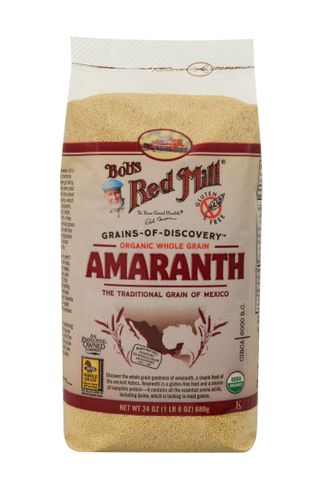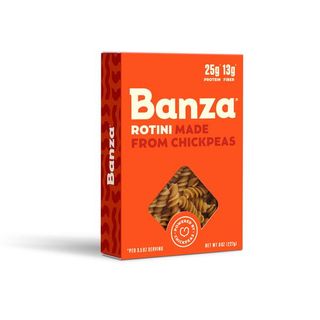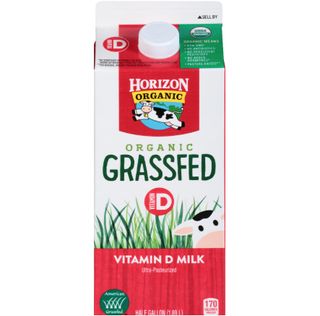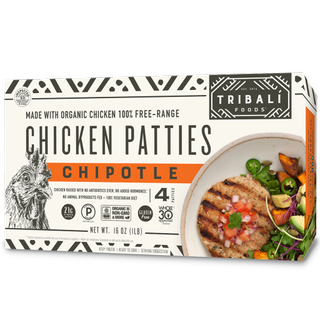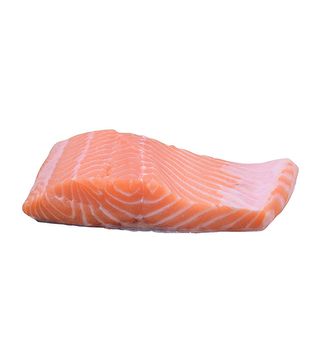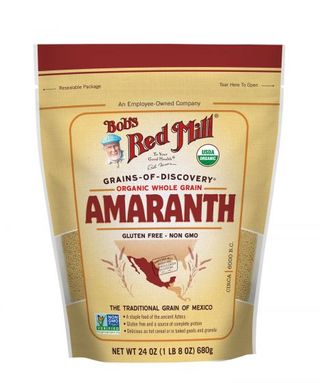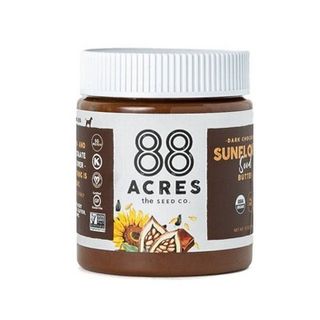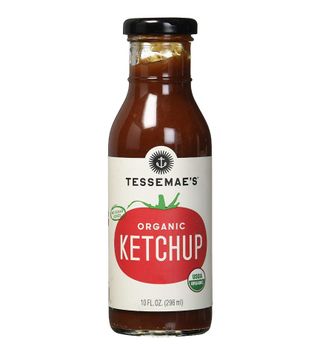This Nutritionist-Approved, Clean-Eating Grocery List Is Actually Realistic
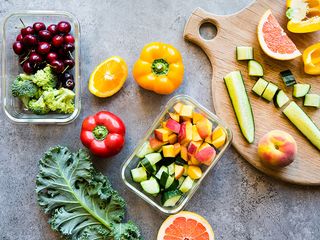
In theory, the concept of eating clean is simple. After all, we're just looking for foods in their natural, unaltered states. But in practice, navigating the supermarket in search of foods untouched by pesticides, chemicals, or processed ingredients is akin to a scavenger hunt. Those looking to adopt this lifestyle will become adept at reading nutritional labels and will most likely have to increase their monthly grocery budget.
However, we'd argue that the benefits far outweigh the drawbacks. Clean eating equates to a balanced diet focused on whole grains, fruits, vegetables, fats, and proteins. Most importantly, this diet is flexible, relatively adaptable to dietary restrictions, and doesn't ban any food groups. Due to the lack of processed ingredients and added sugars, those who eat clean might experience increased energy and mental clarity, lessened inflammation in the body, and clearer skin.
To help us navigate the world of clean eating, we tapped Tracy Lockwood Beckerman, registered dietitian and author of Amazon best seller The Better Period Food Solution, and Kelly LeVeque, Los Angeles–based holistic nutritionist and celebrity health coach. Find their clean-eating tips and grocery store selects below.
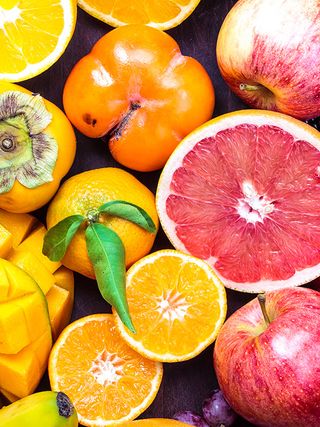
The Basic Principles of Clean Eating
At the end of the day, clean eating is about eating minimally processed, "real" foods that are as close to their natural state as possible. As such, well-thought-out grocery lists and meal prepping are commonplace when trying to stick to this philosophy. People who stick to a "clean" diet abide by the following preliminary tentpoles:
1. Increase your intake of fruit and vegetables.
3. Read nutritional labels.
4. Cut back on refined carbohydrates.
5. Avoid processed vegetable oils and spreads.
6. Avoid added sugars.
7. Cut back on packaged snack foods.
8. Drink lots of water and avoid sugar-sweetened beverages.
To simplify this lifestyle even further, LeVeque and her clients stick to her "fab four" eating philosophy that's centered on protein, fat, fiber, and greens. "It's a light structure to help my clients feel satisfied [and] elongate their blood sugar curve," LeVeque says. These foods also support hormone production, microbiome proliferation, and healthy body composition. "In combination, the fab four ensure [that] you're getting the essential fatty and amino acids you need for cell regeneration and help you build a complete meal that will keep you satisfied for four to six hours," she adds.
Your Clean-Eating Grocery List
Once you've committed to this lifestyle, it's time to clean out your fridge and pantry and stock up on clean-eating essentials. Trader Joe's, Costco, Amazon, Thrive Market, Whole Foods, and your local farmers market are all great places to shop for "clean" produce, snacks, and even packaged products. Below, find your clean-eating grocery list, as informed by Beckerman and LeVeque.
Fruits + Vegetables
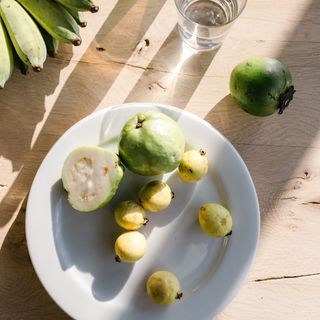
While you definitely have free reign in the produce section, there are still a few rules to consider when eating clean. "In the fruit-and-vegetable department, it's wise to follow the Environmental Working Group guide and adhere to the 'clean 15' and 'dirty dozen,'" advises Beckerman. "That means choosing organic from the dirty-dozen options and choosing nonconventional or non-organic from the clean 15." These terms simply refer to the amount of pesticide residues detected on certain fruits and vegetables, as tested by the U.S. Department of Agriculture and the FDA.
Clean 15: Buy Conventional
Avocados, sweet corn, pineapples, frozen sweet peas, onions, papayas, eggplant, asparagus, kiwis, cabbage, cauliflower, cantaloupes, broccoli, mushrooms, honeydew melons
Dirty Dozen: Buy Organic
Strawberries, spinach, kale, nectarines, apples, grapes, peaches, cherries, pears, tomatoes, celery, potatoes
Beans + Legumes
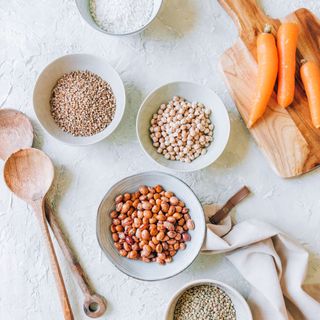
Fortunately, navigating the beans-and-legumes section is relatively straightforward. These products are rich in plant protein, fiber, B vitamins, iron, folate, calcium, and potassium, and they're a great meat replacement for vegetarians and vegans. However, it gets complicated when you opt for canned goods instead of dried—be sure to read the label carefully and purchase organic brands with no added sodium. Opt for BPA-free cans when possible.
When you take the canned restrictions into account, the following sources of fiber are all fair game: black beans, chickpeas, lentils, cannellini beans, kidney beans, split peas, edamame, and hummus. For Beckerman, Banza chickpea pasta is a go-to source of healthy, clean fiber: "Their products are made from chickpeas, which are loaded with iron and protein, so you will actually stay full and energized."
Dairy + Alternatives
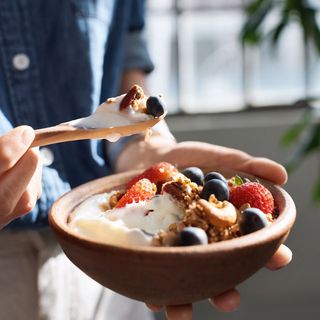
Navigating the dairy aisle is a bit complicated for those who stick to a clean diet. Because the low-fat and fat-free variations of milk, yogurt, cottage cheese, and the like are filled with added sugars and processed fillers, it's best to stick to the whole, full-fat varieties, no matter the product. Here's a full breakdown of the dairy aisle:
Milk: When opting for cow's milk, Horizon Organic is a favorite brand of Beckerman's: "It's my top pick for a clean, reliable, healthy option."
Dairy-free milk: "For those with a dairy allergy, my go-to is Oatly because their alternative milks are full of B vitamins thanks to the oats," explains Beckerman. If you're a fan of almond or rice milk, always go unsweetened, but as The Gracious Pantry reports, it's best to make your own. If you prefer coconut milk, always buy canned—Thai Kitchen is a trusted, clean brand.
Yogurt: When buying yogurt, always go for plain Greek. Beckerman swears by Stonyfield Greek yogurt for a "clean, organic, and trustworthy product made without any harmful or disrupting pesticides."
Cheese: When it comes to cheese, avoid anything that can sit on a shelf or in a cupboard for months without spoiling. That means no cheese slices, powdered cheese, spray cheese, shredded cheese, or low-fat/nonfat cheese. Always buy a real block of cheese, and eat it in moderation. If your recipe calls for shredded cheese, buy a block and shred it yourself.
Poultry
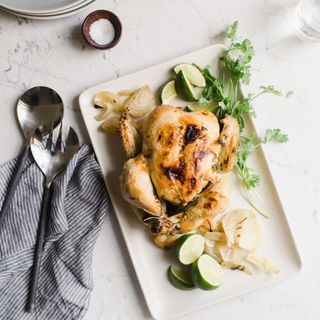
As for poultry, always buy certified-organic chicken raised without antibiotics, and read the package to ensure that there's no added sodium solution. When buying eggs, always opt for organic, cage-free eggs, and pay attention to the sell-by date.
Beckerman loves Tribali Foods for a quick source of healthy, organic poultry. "Their frozen products are 100% organic, non-GMO, and happen to be incredibly delicious," she explains. "They're perfect for those living life on the go because they heat up in less than five minutes and make for a well-balanced, protein-rich meal." The brand also sells organic beef products.
LeVeque is also a fan of buying proteins that cook up quickly. "Chicken cutlets, ground beef, and shrimp can be sautéed up in 10 minutes for easy weeknight dinners," she suggests.
Beef + Fish
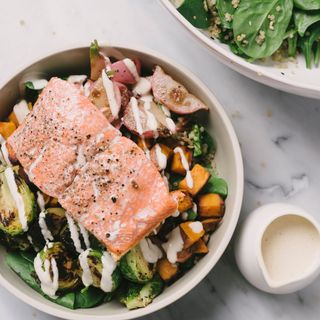
Finding clean beef is all about quality. Ask your butcher to help you select grass-fed, humanely raised beef. As for brands, Strauss Beef is a company "that never gives hormones to their cattle," explains Beckerman. "[It feels good to know] you're eating clean beef without any potential endocrine disruptors," she remarks. "Make sure to check their website for the closest location of products sold near you." You can also buy curated selections online.
As for fish, "Whole Foods takes my pick for the best fish, as their products are sustainably sourced, and the staff is very qualified to answer any questions you may have about the fish," adds Beckerman. Just be wary of any mercury content, and always steer clear of farm-raised salmon.
Grains
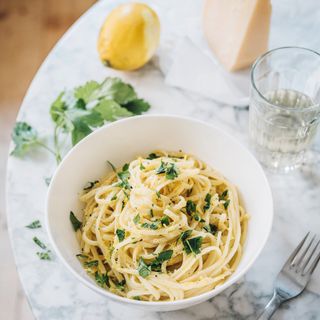
When shopping for clean grains, it helps to stick to a few trusted brands that sustainably produce a wide variety of whole grains. For Beckerman, that brand is Bob's Red Mill. It produces a variety of grains like quinoa, amaranth, sorghum, buckwheat, and millet. It also offers breakfast cereals, granola bars, baking mixes, flours, meals, and more.
"Their grains are made through a low-temperature stone milling process, which helps to ensure the nutrients are left intact in each of their grains," she explains. "They also contain flours and mixes with flour alternatives, so it's fitting for those with gluten intolerance or a gluten allergy."
As for bread, The Gracious Pantry swears by three brands for clean products: Ezekiel, Alvarado Street Bakery, and Trader Joe's. Finally, whole-wheat or whole-grain pasta offers three times more fiber per serving than regular white, but white pasta could be considered "clean" as well.
Nuts + Seeds
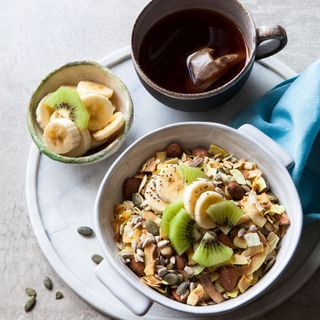
All nuts and seeds purchased on a clean diet should be raw. In other words, there should be no other ingredients listed on the package. When taking this into account, sunflower seeds, sesame seeds, chia seeds, flaxseed, cashews, peanuts, almonds, walnuts, pistachios, and pecans are all fair game.
As for brands, Beckerman swears by 88 Acres' "wonderful and healthy seed-based bars," which are free from the top eight allergens. "They only use easy-to-pronounce and recognizable ingredients, which make them clean in my book," she adds. "Their products range from seed butters to seed bars to even Seed'nola, which makes it great for those looking to get the benefits of seeds into their diet."
Additionally, LeVeque swears by Wild Friends' raw almond butter when snacking. "It's the perfect addition to crackers, raw veggies, or smoothies," she explains. "It's a great source of natural protein, fat, and minerals."
Condiments + Sweeteners

Clean eaters need to tread carefully when shopping for condiments and sweeteners. Most store-bought salad dressings and condiments like ketchup and mustard are actually laden with added sugars and artificial flavors. Here's a full breakdown of the condiment aisle:
Ketchup and mustard: Beckerman swears by Tessemae's ketchup, which is made "predominantly from real tomatoes and doesn't contain any added sugar," she explains. "Their ketchup is vegan, dairy-free, and gluten-free so it's great for those with specific dietary restrictions." The brand also makes organic mustard, barbecue sauce, mayo, dressings and vinaigrettes, hot sauces, and spreads.
Dressings and sauces: The avocado oil–based dressings and sauces from Primal Kitchen are a consistent go-to of LeVeque's. Similar to Tessemae, it sells organic pasta sauces, three different kinds of mayo, 14 different kinds of dressings and marinades, avocado and olive oil, three different kinds of meat sauces, ketchup, mustard, and more.
Sweeteners: "It doesn't get any cleaner or more natural than Wedderspoon Manuka Honey," declares Beckerman. "Their products are non-GMO certified and celebrate the natural healing properties of honey thanks to the live enzymes in their products." Bursting with antibacterial, antimicrobial, and anti-inflammatory properties, the products have "superfood powers."
Disclaimer
This article is provided for informational purposes only and is not intended to be used in the place of advice of your physician or other medical professionals. You should always consult with your doctor or healthcare provider first with any health-related questions.
Kelsey Clark is a freelance writer and content strategist based in Detroit. She got her start in editorial in New York City as MyDomaine's lifestyle editor and has since gone full-time freelance. She now contributes to Who What Wear, THE/THIRTY, Domino, Glamour, The Zoe Report, Apartment Therapy, and more, in addition to working with brands such as Bloomscape and EyeSwoon on content strategy and copywriting. She's written about fashion, interior design, health and wellness, pop culture, food, travel, politics, and professional development, but she'd consider the first three verticals her main "beats." She's also incredibly passionate about mental health awareness and hopes to help eradicate the social stigma through storytelling and education. When she's not writing, you can find her scouring thrift stores for Levi's 501s, picking up a new vintage piece for her apartment, or exploring new restaurants and bars across Detroit.
-
 I Live for Yoga and Pilates—These Are the Pieces That Help My Flow
I Live for Yoga and Pilates—These Are the Pieces That Help My FlowTake notes.
By Humaa Hussain
-
 It's Time to Get Our Nutrition in Check for Summer—This App Is Making It Easy
It's Time to Get Our Nutrition in Check for Summer—This App Is Making It EasyThe recipe ideas are endless.
By Who What Wear
-
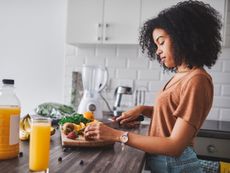 If You're Battling With Digestive Issues, This Could Be Why
If You're Battling With Digestive Issues, This Could Be WhyTurns out, you may not have IBS after all.
By Kia Topps
-
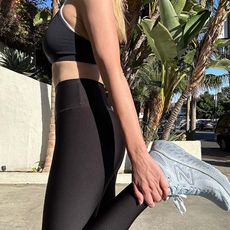 Our Editors Own a Lot of Sneakers, But This Pair Comes in First Place Every Time
Our Editors Own a Lot of Sneakers, But This Pair Comes in First Place Every TimeA major win.
By Aniyah Morinia
-
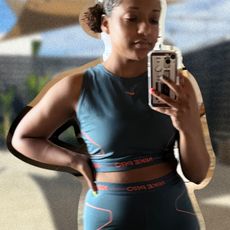 I Changed My Mind About Strength Training When I Tried This Workout
I Changed My Mind About Strength Training When I Tried This WorkoutMy confidence is officially on 10.
By Kia Topps
-
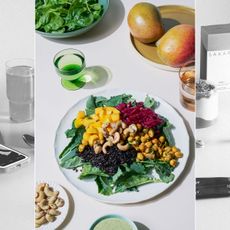 I Only Ate Sakara Life Meals for 30 Days—Here Are 7 Things That Happened
I Only Ate Sakara Life Meals for 30 Days—Here Are 7 Things That HappenedThe brand's 30-Day Fall Reset is finally here.
By Erin Jahns
-
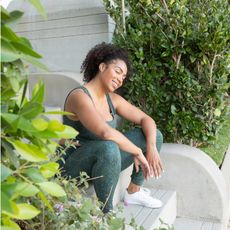 This Type of Gear Will Take Your Workout to the Next Level
This Type of Gear Will Take Your Workout to the Next LevelBring it on.
By Sarah Yang
-
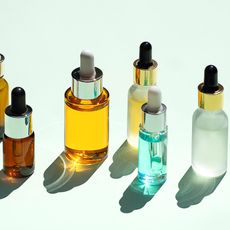 6 Essential Oils That Will Heal Your Painful Sunburns
6 Essential Oils That Will Heal Your Painful SunburnsAll-natural relief ahead.
By Samantha Parsons
